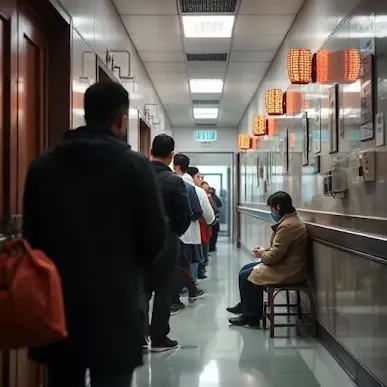TCM Doctor - Daily Free Advice!
- Get link
- X
- Other Apps
Thousands of Years of Experience – Why You Should Trust Traditional Chinese Medicine (TCM)
TCM Clinic in China
Introduction
Traditional Chinese Medicine (TCM) is a healing system with over 2000 years of history. It is based on a holistic approach to health, the harmony between body and mind, and natural healing methods, such as acupuncture, herbal medicine, diet therapy, and energy exercises. Modern science increasingly confirms the effectiveness of TCM in many health aspects, which is why more and more people around the world are turning to these methods. In this article, we will explore why it is worth trusting Traditional Chinese Medicine and how it can improve your quality of life.
The Philosophy of TCM – Harmony of Body and Mind
The foundation of Traditional Chinese Medicine is the belief that the body and mind are one, and health depends on the balance of internal energy, called Qi (Chi). Qi flows through special channels in the body, known as meridians. Disruptions in the flow of Qi can lead to illness and discomfort.
Two key concepts in TCM are Yin and Yang – opposing yet complementary forces. When Yin and Yang are in harmony, the body functions properly. If one of these energies dominates, health problems arise. Therefore, TCM methods aim to restore this balance.
Additionally, the concept of the Five Elements (wood, fire, earth, metal, water) plays an essential role in diagnosis and therapy. Each element is associated with specific organs and emotions. For example, an excess of fire can cause irritability and heart issues, while a deficiency in water is linked to kidney weakness and anxiety.
Methods of Treatment in TCM
TCM offers a wide range of healing methods that support health naturally. Here are the most important ones:
- Acupuncture – An Ancient Therapy Backed by Science
Acupuncture involves inserting thin needles into specific points on the body to restore the proper flow of Qi.
Scientific Studies:
A review of 39 clinical studies published in JAMA Internal Medicine (2012) showed that acupuncture is more effective than placebo in treating chronic pain, including migraines and back pain.
According to research conducted by the National Institutes of Health (NIH), acupuncture can help reduce symptoms of depression and anxiety.
In 2018, the WHO officially recognized acupuncture as an effective treatment for over 100 conditions, including neuropathic pain, digestive diseases, and insomnia.
- Herbal Medicine – The Natural Power of Plants
Herbal medicine is one of the pillars of TCM. It uses herbal blends that support the body and strengthen the immune system.
Examples of Effectiveness:
- Ginseng root (Panax ginseng) – known for its adaptogenic properties, supporting energy and immunity.
- Astragalus (Huang Qi) – used to strengthen the immune system.
- Turmeric – although mainly associated with Ayurveda, it is frequently used in TCM to reduce inflammation.
- Licorice – aids in digestive issues and supports the respiratory system.
- Diet Therapy – Food as Medicine
In TCM, diet is tailored to the individual's needs and weather conditions. The principle of the five tastes (sweet, sour, bitter, spicy, salty) helps regulate organ function.
Scientific Confirmation:
A diet based on whole foods, rich in antioxidants and healthy fats, can reduce the risk of heart disease and cancer (Harvard T.H. Chan School of Public Health, 2019).
Consuming foods with thermal properties (e.g., warm teas in winter) helps regulate the body’s functions and digestion.
- Energy Exercises: Qi Gong and Tai Chi
Qi Gong and Tai Chi are exercise systems that improve the flow of Qi in the body. Regular practice strengthens the immune system, improves balance, and reduces stress.
Scientific Studies:
- Journal of the American Geriatrics Society (2017) – Tai Chi improves balance and reduces the risk of falls in older adults.
- PLOS One (2015) – Qi Gong lowers cortisol levels, the stress hormone.
Can TCM Be Combined with Western Medicine?
Yes! Increasingly, doctors and therapists recommend a holistic approach to health by combining Western diagnostic and treatment methods with TCM. For example, acupuncture is used in hospitals worldwide as a complementary treatment for pain and rehabilitation.
In China, Western medicine and TCM coexist in hospitals, and doctors often prescribe both synthetic drugs and herbal remedies.
Clinical Cases and Success Stories
TCM has a long history of success in treating various conditions, such as:
- Insomnia – Acupuncture and herbs, such as Suan zao ren, help regulate the sleep cycle.
- Autoimmune Diseases – Herbs like Reishi (Ganoderma) can regulate the immune system.
- Digestive Issues – The use of ginger and licorice can alleviate symptoms of acid reflux and heartburn.
Conclusion – Why Trust TCM?
TCM is based on thousands of years of experience, and modern science increasingly confirms the effectiveness of its methods. Acupuncture, herbal medicine, diet therapy, and energy exercises can effectively support the body. The holistic approach of TCM makes it an excellent complement to Western medicine and, in many cases, can even replace it.
If you are looking for natural and proven ways to improve your health, Traditional Chinese Medicine could be the perfect choice for you!

Comments
Post a Comment